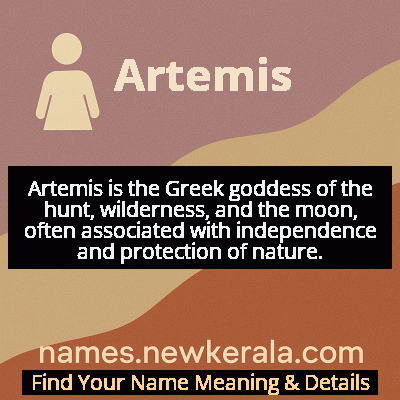Artemis Name Meaning & Details
Origin, Popularity, Numerology Analysis & Name Meaning of Artemis
Discover the origin, meaning, and cultural significance of the name ARTEMIS. Delve into its historical roots and explore the lasting impact it has had on communities and traditions.
Name
Artemis
Gender
Female
Origin
Greek
Lucky Number
4
Meaning of the Name - Artemis
Artemis is the Greek goddess of the hunt, wilderness, and the moon, often associated with independence and protection of nature.
Artemis - Complete Numerology Analysis
Your Numerology Number
Based on Pythagorean Numerology System
Ruling Planet
Uranus (Rahu)
Positive Nature
Strong sense of order, loyal, practical, and disciplined.
Negative Traits
Stubborn, overly serious, rigid, and prone to feeling restricted.
Lucky Colours
Blue, gray.
Lucky Days
Saturday.
Lucky Stones
Blue sapphire.
Harmony Numbers
1, 7, 8.
Best Suited Professions
Managers, engineers, accountants, organizers.
What People Like About You
Dependability, discipline, practicality.
Famous People Named Artemis
Artemis I of Caria
Ancient Ruler
Female naval commander who fought in the Battle of Salamis
Artemisia Gentileschi
Baroque Painter
First woman accepted into the Accademia di Arte del Disegno in Florence
Artemis Pebdani
Actress
Critically acclaimed television actress in multiple award-winning series
Name Variations & International Equivalents
Click on blue names to explore their detailed meanings. Gray names with will be available soon.
Cultural & Historical Significance
Her cultural significance evolved through history, with Renaissance artists like Artemisia Gentileschi drawing inspiration from her strength and independence. In contemporary times, Artemis has become an icon for environmental movements, women's empowerment, and the reclamation of feminine power. The NASA Artemis program, aimed at returning humans to the Moon, consciously evokes her lunar associations and pioneering spirit. This continuous reinvention demonstrates how ancient archetypes can maintain relevance across millennia, adapting to address contemporary concerns while preserving their core symbolic power. The name Artemis thus carries not just mythological weight but represents an ongoing cultural conversation about nature, femininity, and independence.
Extended Personality Analysis
Those named Artemis often embody a unique combination of strength and sensitivity, reflecting their namesake's dual nature as both hunter and protector. They typically exhibit remarkable self-reliance from an early age, preferring to solve problems independently rather than seeking assistance. This independence is balanced by fierce loyalty to their chosen companions—much like the mythological Artemis and her nymphs. They often possess keen observational skills and strategic thinking, able to assess situations with clarity and precision. Many display a natural affinity for the outdoors and animals, feeling most at peace in natural settings. Their strong moral compass makes them advocates for justice, particularly in defending the vulnerable or protecting the environment.
In social settings, Artemis-named individuals may initially appear reserved or contemplative, but this masks deep emotional intelligence and empathy. They form meaningful, lasting relationships based on mutual respect rather than social convenience. When challenged, they can demonstrate the formidable nature of their namesake—articulate, principled, and unwilling to compromise their core values. Career-wise, they often gravitate toward fields that allow autonomy and align with their principles, such as environmental science, veterinary medicine, law, or arts. Their leadership style tends to be collaborative yet decisive, inspiring loyalty through competence and integrity rather than authority. The name seems to carry an expectation of strength that many bearers grow into, developing resilience and confidence through life's challenges.
Modern Usage & Popularity
Artemis has transitioned from a primarily academic or mythological reference to an increasingly popular given name, particularly among parents seeking names with strong female associations and classical roots. Its usage has grown steadily since the 1990s, with a notable acceleration in the 2010s as mythological names gained broader acceptance. Current data shows it ranking within the top 500 girls' names in the United States, with similar trends observed in other English-speaking countries and parts of Europe. The name's appeal crosses demographic boundaries, though it sees higher usage among educated urban families. Its popularity has been boosted by several factors: the rise of mythological names in general, increased interest in names celebrating female strength, and prominent cultural references like the Artemis Fowl series and NASA's Artemis space program. Social media has also normalized unusual classical names, making Artemis feel both distinctive and accessible. Unlike many trending names, Artemis maintains an air of sophistication that prevents it from feeling trendy or dated, suggesting it may have lasting power as a modern classic.
Symbolic & Spiritual Meanings
The name Artemis carries rich symbolic layers that extend far beyond its mythological origins. Primarily, it represents the untamed wilderness—both external landscapes and the wild, authentic self that exists beyond social constraints. As a lunar deity, Artemis symbolizes intuition, cycles, and the reflective nature of consciousness. Her bow signifies focused intention and the ability to manifest goals with precision, while her arrows represent penetrating insight and truth-seeking. Modern interpretations often position Artemis as an archetype of the complete woman—self-defined, physically capable, intellectually sharp, and emotionally complex. She symbolizes the integration of apparent opposites: hunter and protector, independent and communal, fierce and nurturing. Environmental movements have adopted her as a patron of wilderness conservation, seeing in her the ideal balance between humanity and nature. For many contemporary women, Artemis represents bodily autonomy and reproductive freedom, drawing from her role as both virgin goddess and childbirth protector. The name ultimately symbolizes wholeness—the capacity to contain multitudes without contradiction, to be both powerful and compassionate, independent and connected, wild and wise.

